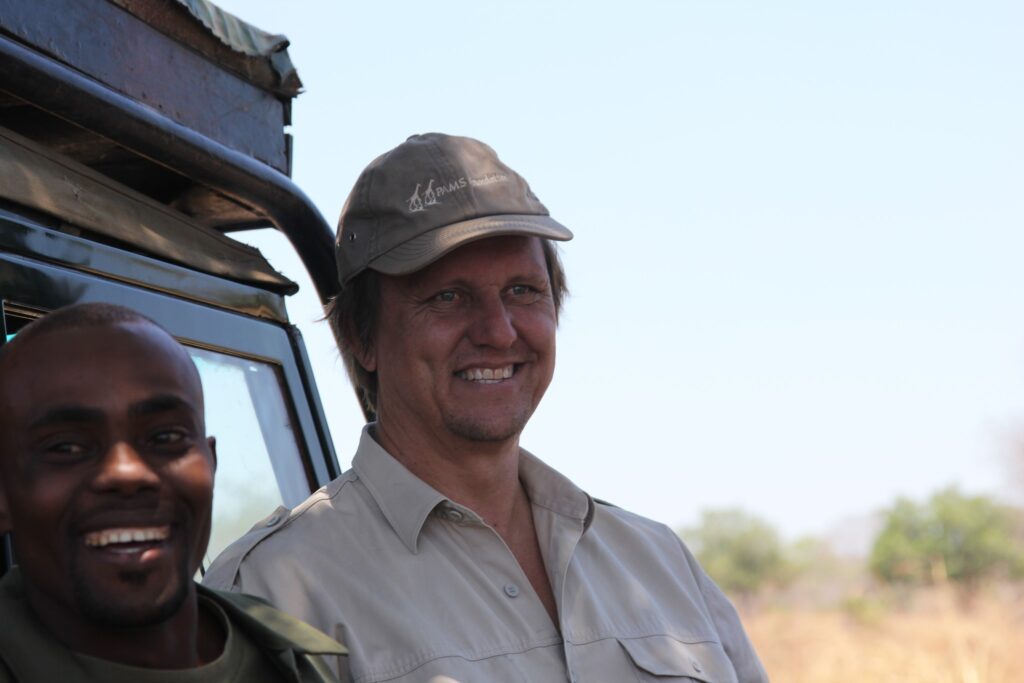Wayne Lotter, a South African anti-poaching activist, was murdered in Dar es Salaam, Tanzania, in 2017
Eleven people have been sentenced to death in Tanzania for the 2017 killing of South African anti-poaching activist, Wayne Lotter.
The verdict, which came more than five years after Mr Lotter was shot dead while travelling in a taxi in the Masaki district of Dar es Salaam, is being described as a significant win in the fight against animal poaching in the East African nation.
Mr Lotter was the co-founder of Pams Foundation, a non-profit organisation that supports anti-poaching initiatives across Africa by providing expertise and help to communities and governments.
Poachers in Tanzania target various wildlife, including elephants that are often killed for their tusks.
Lotter was the director and co-founder of the PAMS Foundation, which said he had helped to train thousands of game scouts throughout Tanzania and developed an “intelligence-based approach” to anti-poaching that had success in countering wildlife trafficking.
Krissie Clark, who co-founded the foundation with Lotter, in 2019 said that her colleague had received multiple death threats over his work with PAMS before being killed.
“If we really want to defeat this illegal wildlife trafficking, we have to go for the blood supply; we have to stop the money at the heart of this crime,” Clark said.
After the announcement of the sentences, Clark released a statement saying she and her colleagues were relieved the trial was over.
“Wayne’s murder and the sentencing of the eleven accused should serve as a reminder to everyone that poaching and wildlife crime is devastating to all of us,” she said. “It destroys Tanzania’s extraordinary natural heritage and damages families and communities. Wildlife crime doesn’t pay.”
At the time of his death, he had become one of the leading conservationists and a central figure in East Africa’s fight against poaching, partially responsible for some of the biggest ivory busts in the continent’s history.
In 2015, with Mr Lotter’s help, Tanzania’s elite anti-poaching National and Transnational Serious Crimes Investigation Unit arrested Yang Feng Glan, a Chinese citizen, who led one of the biggest ivory syndicates in East Africa.
Yang, who was called the Queen of Ivory, is serving a 15-year sentence for trafficking 860 elephant tusks worth more than $6 million.
Between 2009 and 2014, ivory poachers decimated Tanzania’s elephant population, reducing it by more than 60 per cent.

This was no doubt the reason Mr Lotter had received multiple death threats for the work he and his organisation were carrying.
Since 2012, the NTSCIU has arrested nearly 3,000 poachers and ivory traffickers leading to prison sentences over 90 per cent of the time.
It took investigators years to build their cases against the 11 people convicted in Mr Lotter’s murder, who include the two gunmen and nine accomplices.
“It really feels like we finally achieved our milestone that we’ve been plugging away at for so long,” said Krissie Clark, “It just feels amazing to be able to close this chapter.
While the 11 were given death sentences, that equates to life in prison, as Tanzania has not carried out an execution since 1995, Pams Foundation said.
The case took half a decade to wind its way through the Tanzanian justice system, with multiple attempts to derail it, explained Mary Rice, Executive Director of the Environmental Investigation agency.
Ms Rice described Mr Lotter’s death as “well planned” and a “co-ordinated assassination.”
“Someone who was threatened by the success of Wayne and Krissie’s efforts to address organised poaching and ivory trafficking networks that had been operating out of Tanzania for so long. Someone with influence, protection and financial backing.”
She credited the Tanzanian government with seeing the case through.
“That Tanzania has recognised this and has ensured the case was followed through with due process demonstrates a positive step in the fight against the corruption that plagues so many similar cases,” she told The National.
Ms Clark, who was in the car with Mr Lotter when he was murdered, said the last five years had been “challenging” and that she was looking forward to “moving on” and continuing Mr Lotter’s life work.
“He was an incredible guy with dedication, passion and integrity,” she told The National. “If everyone could work with the same passion, dedication and determination as he did, this [world] would be an incredible place.”
In her sentencing, Judge Edith Mgonya said “[Wayne’s] death did not only affect his family, his foundation and his friends but Tanzania as a destination and the world at large.”
In a final tribute to her late colleague, Clark says that Lotter’s legacy of creativity, resilience, compassion and total dedication to conservation lives on through PAMS Foundation’s work. “Wayne had a remarkable ability to inspire people with his passion for wildlife and his legendary sense of humor. His spirit lives on in the work we do every day”
Share this news
This Year’s Most Read News Stories

Zanzibar: Containers and dhows carrying alcohol stuck at Malindi Port
ZMMI, Scotch Store and One Stop Company have filed contempt of court case against Nicholas Eshalin, the chief executive officer of the Zanzibar Multipurpose TerminalContinue Reading

Zanzibar Airport Authority to audit ground handlers
Unguja. The Zanzibar Airports Authority (ZAA) is set to conduct an audit on ground handling companies that currently operate at the Abeid Amani Karume Airport with effect from Monday. The week-long audit is set to include Transworld, ZAT and the newcomer Dnata Zanzibar who were licensed in June plus exclusive rights to manage Terminal 3 building by ZAA.Continue Reading

Tanzania Declares End of Marburg Virus Disease Outbreak

Tanzania today declared the end of Marburg virus disease outbreak after recording no new cases over 42 days since the death of the last confirmed case on 28 January 2025.
The outbreak, in which two confirmed and eight probable cases were recorded (all deceased), was the second the country has experienced. Both this outbreak, which was declared on 20 January 2025, and the one in 2023 occurred in the north-eastern Kagera region.
In response to the latest outbreak, Tanzania’s health authorities set up coordination and response systems, with support from World Health Organization (WHO) and partners, at the national and regional levels and reinforced control measures to swiftly detect cases, enhance clinical care, infection prevention as well as strengthen collaboration with communities to raise awareness and help curb further spread of the virus.
Growing expertise in public health emergency response in the African region has been crucial in mounting effective outbreak control measures. Drawing on experience from the response to the 2023 Marburg virus disease outbreak, WHO worked closely with Tanzanian health authorities to rapidly scale up key measures such as disease surveillance and trained more than 1000 frontline health workers in contact tracing, clinical care and public health risk communication. The Organization also delivered over five tonnes of essential medical supplies and equipment.
“The dedication of frontline health workers and the efforts of the national authorities and our partners have paid off,” said Dr Charles Sagoe-Moses, WHO Representative in Tanzania. “While the outbreak has been declared over, we remain vigilant to respond swiftly if any cases are detected and are supporting ongoing efforts to provide psychosocial care to families affected by the outbreak.”
Building on the momentum during the acute phase of the outbreak response, measures have been put in place to reinforce the capacity of local health facilities to respond to potential future outbreaks. WHO and partners are procuring additional laboratory supplies and other equipment for disease detection and surveillance and other critical services.
Marburg virus disease is highly virulent and causes haemorrhagic fever. It belongs to the same family as the virus that causes Ebola virus disease. Illness caused by Marburg virus begins abruptly. Patients present with high fever, severe headache and severe malaise. They may develop severe haemorrhagic symptoms within seven days.
In the African region, previous outbreaks and sporadic cases have been reported in Angola, the Democratic Republic of the Congo, Ghana, Kenya, Equatorial Guinea, Rwanda, South Africa and Uganda.
Source: allafrica.com










